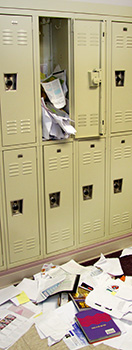Which study skills strategies can improve students’ academic performance?
Page 6: Materials Organization
 No matter how much effort teachers spend organizing their rooms and creating places for items such as supplies and completed homework, some students—especially those with LD or ADHD—will struggle with keeping their desk, binders, lockers, and backpacks organized. Their inability to organize materials can be a major obstacle to academic success and often leads to frustration and panic. Although these students might think that they are organized, their systems are often flawed. For example, a student might put all returned papers into a single binder as soon as the teacher returns them. However, because this student has seven classes, the papers become jumbled and are difficult to access when studying for a test in a given subject. Or a student records the date of her next test on a post-it note and drops it into her overflowing purse. The act of recording the date of the test is a great start, but it is not useful if that note then goes missing and is not rediscovered until months later. Recall that Erin struggles with organization.
No matter how much effort teachers spend organizing their rooms and creating places for items such as supplies and completed homework, some students—especially those with LD or ADHD—will struggle with keeping their desk, binders, lockers, and backpacks organized. Their inability to organize materials can be a major obstacle to academic success and often leads to frustration and panic. Although these students might think that they are organized, their systems are often flawed. For example, a student might put all returned papers into a single binder as soon as the teacher returns them. However, because this student has seven classes, the papers become jumbled and are difficult to access when studying for a test in a given subject. Or a student records the date of her next test on a post-it note and drops it into her overflowing purse. The act of recording the date of the test is a great start, but it is not useful if that note then goes missing and is not rediscovered until months later. Recall that Erin struggles with organization.
Listen as she discusses how this impeded her ability to turn in homework (time: 2:04).

Transcript: Erin
I have a lot of difficulty organizing materials or assignments or anything. My organization skills are quite severely lacking, and it causes a lot of problems getting assignments to school. One of the main problems is because I misplace it. If I don’t put it in the same place every time, or I think I put it on my desk and I actually put it by my backpack and then I head off to school, and I don’t have what I need. I almost always have problems finding the materials or information I need to complete tests or projects of any kind. My workspace is generally very cluttered, and so I often spend twice if not three times as long trying to find everything I need to get a project done as I spend actually working on the task. I would say I probably spend a lot of time and energy on assignments because I usually end up doing them more than once. And so I would have three to five copies of different assignments that I’d done. And it was just that I had done the work over and over and over again and lost it or didn’t take it to school. It just was disorganized and not where it should be. Some days it would make it to school, but then it would get left in my locker. Some days it wouldn’t even make it to school. It depended. Like, one day I might do it and forget it home, and so when I get to school I think, “Man, I really need to do this, so I’ll do it real quick before class.” And then I’ll lose it and leave it in my locker or something. So then it never makes it to the teacher. And so then I have a zero, but I already have two copies. So when I go home and I can’t find either one, I end up doing it again, and it’s just an endless cycle of I’m doing the work, and it never quite gets to that last step of the teacher’s hands. It wasn’t that I wasn’t trying, because I was. It just never clicked. And it was very hard to remember until I took steps to correct it. It was not that I didn’t want to do the work or that I was being lazy. It’s just that organization as a whole didn’t make any sense at all to me.
Teachers can help students become more organized by teaching them strategies. One simple strategy is to teach students how to self-monitor their actions by using a checklist. As discussed previously, students can recall steps or a list of actions better if they are presented with a mnemonic (e.g., BAND). Initially, the teacher might want to provide the student with a cue card with the mnemonic and items listed (and possibly a checkbox beside each item), the use of which can gradually fade over time as the student becomes more fluent with the strategy.
BAND
BAND (Buy a different notebook for each class, Always divide each notebook into sections, Need to update your notebook daily, Do buy a new notebook immediately if you lose one) can help students to more effectively organize their binders.
Research Shows
- Thirty-seven fourth- through seventh-grade students with ADHD received an eight-week intervention targeting the organization of binders, book bags, and lockers. At the end of the period, the students demonstrated improved organizational skills in these areas.
(Langberg, Epstein, Urbanowicz, Simon, & Graham, 2008) - Middle school students with ADHD who often were not prepared for class (i.e., being punctual, being ready for class [seated, eyes on teacher], and having supplies [paper, notebook, pen or pencil]) were taught how to self-monitor their actions by using a checklist and to self-evaluate how well they followed the behaviors on that checklist. On average these students were prepared for class less than 50% of the time prior to the intervention in comparison to an average of 100% after it.
(Gureasko-Moore, DuPaul, & White, 2007) - When a Tier 3 organizational skill intervention used for students with ADHD was adapted for use with general education students and explicitly taught, students’ organization of assignments, papers, binders, and backpacks improved.
(Britton-Rumohr & Lannie, 2022)
Tip
A checklist of what needs to be gathered for class or home or a to-do list of what work needs to be completed or turned in can help students to stay on track.Activity
Because the inability to organize materials often is a stumbling block to academic success of some students and leads their frustration, it is often beneficial for the teacher to develop a mnemonic to help students remember the steps they should take to stay organized. Listed below are several areas in which students with weak organizational skills often struggle. Choose one area and develop a mnemonic to help the student improve their organizational strategies. Using this mnemonic, create a checklist for the student to use to make sure he or she has completed each step of the strategy.
- Desk or lockers
- Notebooks or binders (with the exception of BAND)
- Materials for class (e.g., homework, books)
- Materials for home